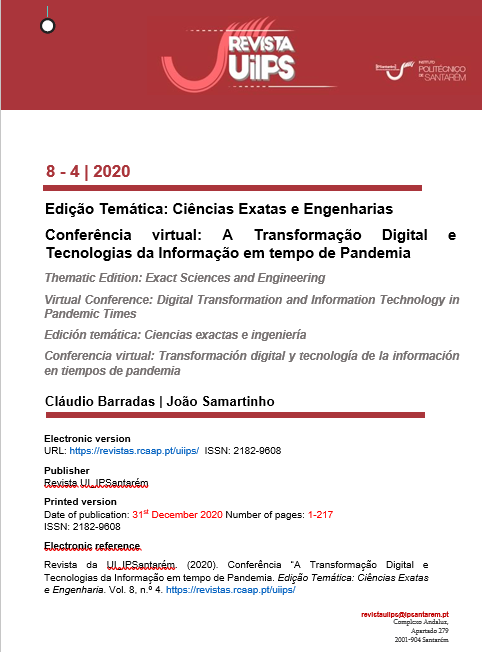PROJETO “MOOC: INTRODUÇÃO AO GIT”, SOLUÇÕES PARA FORMAÇÕES PROFISSIONAIS EM TEMPO DE PANDEMIA
DOI:
https://doi.org/10.25746/ruiips.v8.i4.21985Palavras-chave:
e-Learning, formação profissional, acessibilidade, Git, MOOCResumo
O presente projeto assenta na crescente relevância da utilização de plataformas de formação online no que respeita à disponibilização e acessibilidade de recursos formativos à distância, assumindo uma importância cada vez mais proeminente devido à atual situação pandémica. Com recurso à tecnologia dos Massive Open Online Course (MOOC), a presente oferta formativa visa a aprendizagem sobre o Software GIT. Um MOCC é uma modalidade de curso online com a particularidade de ser livre e sem restrições de acesso a qualquer individuo que manifeste interesse em aprender. É caracterizado por ser aberto, informal e gratuito, e com grande escalabilidade na oferta formativa online. Neste contexto, todos os cursos ministrados estão acessíveis a todos e sem exigência de qualificações mínimas para a sua participação. Permitem, igualmente, o acesso a grandes comunidades, sejam estudantes ou profissionais dos mais variados quadrantes, assumindo-se como uma alternativa bastante credível para a difusão do conhecimento e contribuindo para a formação profissional e pessoal de quem os frequenta. Através da plataforma e-Raizes Redes, é possível aceder-se aos conteúdos formativos “MOOC – Introdução ao Git”, que irão permitir uma aprendizagem mais concreta sobre o Software GIT, com particular incidência nos procedimentos para a sua instalação e utilizações mais básicas, na ótica do utilizador.
Downloads
Publicado
Como Citar
Edição
Secção
Licença
Autores que publicam nesta revista concordam com os seguintes termos:
- Autores conservam os direitos de autor e concedem à revista o direito de primeira publicação, com o artigo simultaneamente licenciado sob a Licença Creative Commons Attribution que permite a partilha do trabalho com reconhecimento da autoria e publicação inicial nesta revista.
- Autores têm autorização para assumir contratos adicionais separadamente, para distribuição não-exclusiva da versão do artigo publicado nesta revista (ex.: publicar em repositório institucional ou como capítulo de livro), com reconhecimento de autoria e publicação inicial nesta revista.
- Autores têm permissão e são estimulados a publicar e distribuir o seu trabalho online (ex.: em repositórios institucionais ou na sua página pessoal) a qualquer ponto antes ou durante o processo editorial, já que isso pode gerar alterações produtivas, bem como aumentar o impacto e a citação do trabalho publicado.



